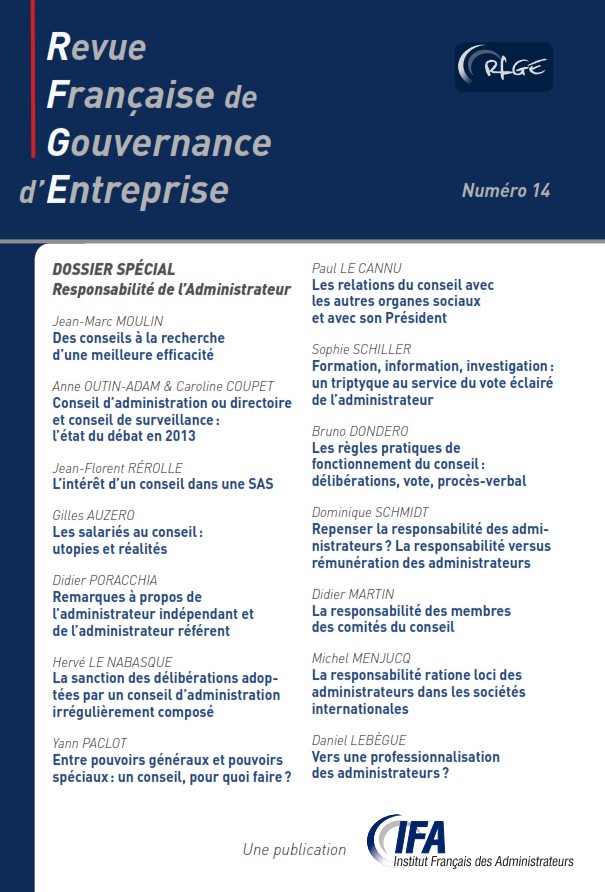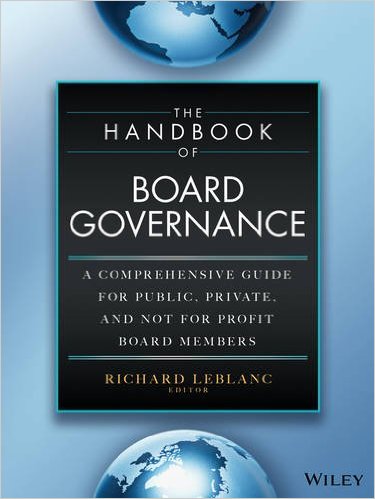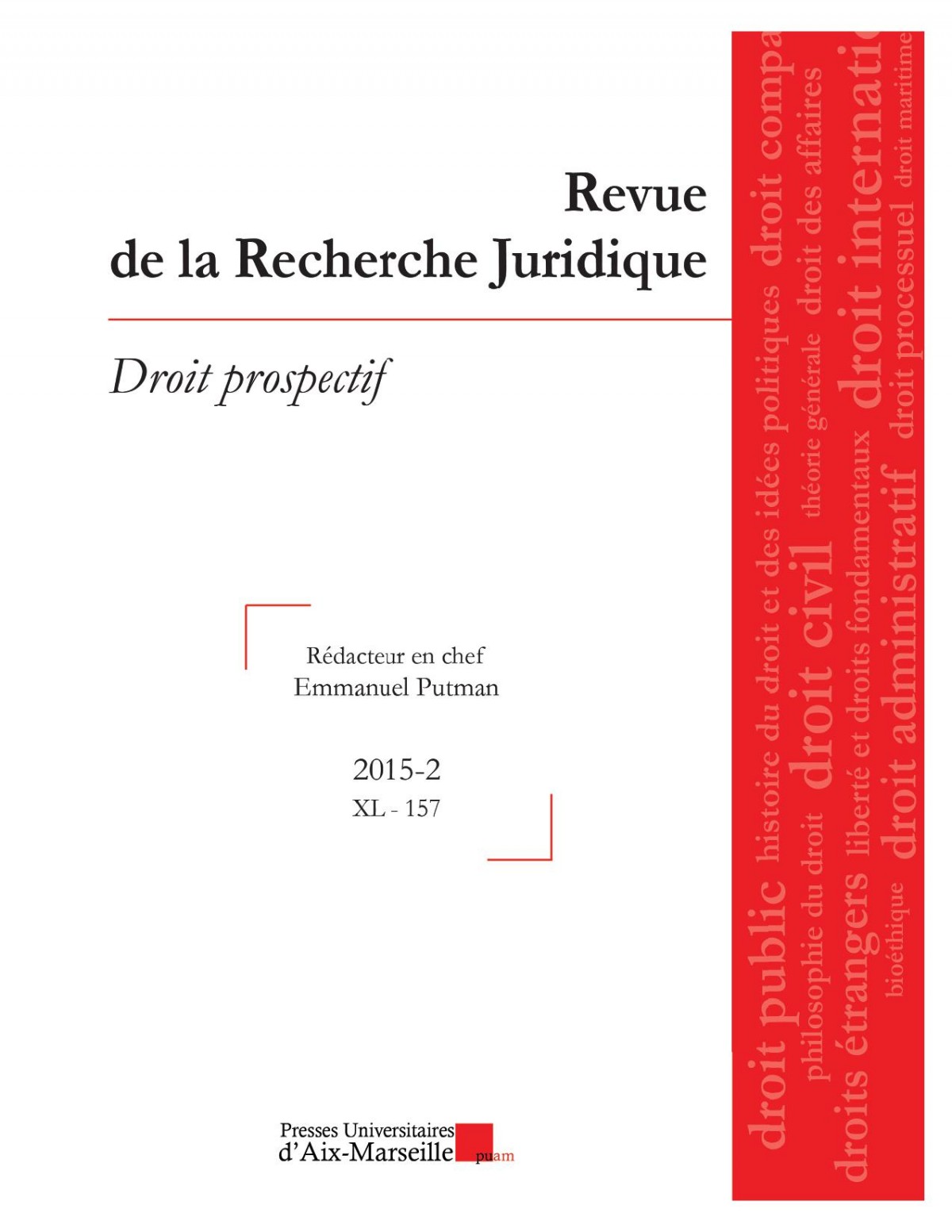autres publications Gouvernance normes de droit
RFGE n0 14 : un sommaire qui donne envie
Ivan Tchotourian 13 mars 2016
Le n0 14 de la Revue française de gouvernance d’entreprise (RFGE) nous offre un beau numéro puisqu’ouvert aux problématique juridiques de la gouvernance des entreprises.
Je vous laisse découvrir le sommaire :
- Jean-Marc MOULIN – Des conseils à la recherche d’une meilleure efficacité
- Anne OUTIN-ADAM & Caroline COUPET – Conseil d’administration ou directoire et conseil de surveillance : l’état du débat en 2013
- Jean-Florent RÉROLLE – L’intérêt d’un conseil dans une SAS
- Gilles AUZERO – Les salariés au conseil : utopies et réalités
- Didier PORACCHIA -Remarques à propos de l’administrateur indépendant et de l’administrateur référent
- Hervé LE NABASQUE – La sanction des délibérations adoptées par un conseil d’administration irrégulièrement composé
- Yann PACLOT -Entre pouvoirs généraux et pouvoirs spéciaux : un conseil, pour quoi faire ?
- Paul LE CANNU – Les relations du conseil avec les autres organes sociaux et avec son Président
- Sophie SCHILLER -Formation, information, investigation : un triptyque au service du vote éclairé de l’administrateur
- Bruno DONDERO – Les règles pratiques de fonctionnement du conseil : délibérations, vote, procès-verbal
- Dominique SCHMIDT – Repenser la responsabilité des administrateurs ? La responsabilité versus rémunération des administrateurs
- Didier MARTIN – La responsabilité des membres des comités du conseil
- Michel MENJUCQ – La responsabilité ratione loci des administrateurs dans les sociétés internationales
- Daniel LEBÈGUE – Vers une professionnalisation des administrateurs ?
Pour commander la RFGE, cliquez ici.
À la prochaine…
Ivan Tchotourian
autres publications Gouvernance rémunération
Pourquoi les rémunérations augmentent-elles ?
Ivan Tchotourian 27 février 2016
Deux chercheurs de la Rotman School viennent de publier une étude intéressante sur la rémunération des dirigeants intitulée : « You scratch his back, he scratches mine and I’ll scratch yours:Deception in simultaneous cyclic networks ».
Résumé :
Markets with increasing specializations demand service exchanges among professionals,forming networks of delegations (e.g., A represents B, B represents C, and C represents A). Inthree studies, we explore « unethical favors » arising from such simultaneous cyclic networkswhere everyone decides simultaneously whether to misrepresent key information for theirprincipals. Study 1 and 2 found that participants in such networks were more likely to liethan they would if they worked for themselves. This increased deception may be drivenby the anticipation that their lies will be indirectly reciprocated. Indeed, Study 3 foundthat deception decreased when the chain of delegations was broken (i.e., A represents Band B represents C). Moreover, self-report measures suggested that increased deceptionin simultaneous cyclic network was indeed due to anticipated indirect reciprocity. Thus,although reciprocity fosters trust and cooperation it can also create an interlocked circle ofdeception.
Pour une synthèse de cette étude, cliquez ici.
A recent study by two Canadian business schools into what causes inflated executive pay upends some of the conventional wisdom about what causes executive salaries to increase over time. For one, it’s not caused by CEOs explicitly colluding with their peers who sit on their company’s compensation committees. Nor is it solely dictated by objective performance metrics. In the study, titled “You scratch his back, he scratches mine and I’ll scratch yours: Deception in simultaneous cyclic networks,” researchers from the Rotman School of Management and the Ted Rogers School of Management found that inflated pay is actually caused by something they’ve labeled the “indirect reciprocity effect”—an unwritten code that can pervade c-suites.
À la prochaine…
Ivan Tchotourian
autres publications Gouvernance mission et composition du conseil d'administration place des salariés
Article sur la gouvernance des entreprises en Allemagne
Ivan Tchotourian 18 février 2016
Le professeur Klaus Hopt qu’on ne présente plus vient de publier un nouvel article qui intéressera les lecteurs de notre blogue : « The German Law of and Experience with the Supervisory Board » (ECGI, Law Working Paper No. 305/2016).
Together with a number of other countries including China, Germany has a two-tier board system, i.e. its stock corporation law provides for the division between the management board and the supervisory board. This is different from most other countries, for example the USA, the United Kingdom, Switzerland and others.
Both board systems have their assets, yet in principle both fulfil adequately the task of control over management; there is no clear superiority of one of the two of them. The national board systems are highly path-dependent. Germany has had the supervisory board ever since the late 19th century when the state gave up its concession system, i.e. the approval and supervision of corporations by the state, and introduced a mandatory supervisory board to take over this task from the state. Germany strictly refuses to give shareholders the option to choose between the two systems.
Labor codetermination in the supervisory board may be one of the reasons for this refusal. While European legislators have been rather prudent in regulating board matters, there has been a considerable de facto convergence between the two systems. Yet path-dependent divergences remain, as to Germany this is true particularly in respect of quasi-parity and full parity labor codetermination in the board of corporations, but also as regards stakeholder orientation and a codified law of groups of companies featuring corresponding board duties for both parent and subsidiary companies.
The German Stock Corporation Act and the German Corporate Governance Code contain extensive provisions on both the management board and the supervisory board. The provisions on the supervisory board have been considerably reformed since the late 1990s. Today, German corporate governance under the two-tier board system is more or less in line with international good corporate governance.
In Germany there are considerable controversies concerning (i) the diversity requirements of 2015, (ii) the definition of independence for supervisory board candidates, (iii) the pros and cons of mandatory quasi-parity and full-parity labor codetermination and (iv) the role of the non-binding German Corporate Governance Code. The article pursues two goals: It informs a non-German audience on the regulation of the supervisory board in Germany, both by law and code, highlighting major current problems and controversies, and it undertakes a functional assessment of the experience with and the functioning of the supervisory board in a comparative perspective.
À la prochaine…
Ivan Tchotourian
autres publications devoirs des administrateurs Gouvernance mission et composition du conseil d'administration normes de droit rémunération
Osler : que retenir de 2015 en matière de gouvernance ?
Ivan Tchotourian 28 janvier 2016
Le cabinet Osler propose une intéressante rétrospective juridique de l’année 2015 en matière de gouvernance d’entreprise : « Gouvernance : la composition des conseils d’administration et la rémunération sous les projecteurs ».
La composition des conseils d’administration et le recrutement ont continué d’être des questions clés en matière de gouvernance en 2015, à la suite de modifications apportées aux exigences en matière de divulgation et d’initiatives relatives à la gouvernance d’entreprise de la part d’investisseurs institutionnels visant à promouvoir la possibilité pour les actionnaires de proposer des candidats (l’accès aux procurations), et ce, aux États-Unis et au Canada. La rémunération est aussi demeurée une question prioritaire. Alors que des actionnaires institutionnels ont manifesté leur opposition lors de votes consultatifs sur la rémunération tenus par trois grands émetteurs canadiens, la Securities and Exchange Commission a mis de l’avant plusieurs initiatives réglementaires relatives à la rémunération.
Je vous laisse découvrir la suite…
À la prochaine…
Ivan Tchotourian
autres publications Gouvernance
Ouvrage de Richard Leblanc : le Board Governance détaillé
Ivan Tchotourian 20 janvier 2016
Le professeur Richard Leblanc de York University (qui anime un blogue très intéressant) av publier d’ici peu (mai 2016 !) un ouvrage passionnant chez Wiley : «
The Handbook of Board Governance provides comprehensive, expert-led coverage of all aspects of corporate governance for public, nonprofit, and private boards. Written by collaboration among subject matter experts, this book combines academic rigor and practitioner experience to provide thorough guidance and deep insight. From diversity, effectiveness, and responsibilities, to compensation, succession planning, and financial literacy, the topics are at once broad-ranging and highly relevant to current and aspiring directors. The coverage applies to governance at public companies, private and small or medium companies, state-owned enterprises, family owned organizations, and more, to ensure complete and clear guidance on a diverse range of issues. An all-star contributor list including Ram Charan, Bob Monks, Neil Minow, and David Nadler, among others, gives you the insight of thought leaders in the areas relevant to your organization.
Pour en savoir plus, cliquez ici.
À la prochaine…
Ivan Tchotourian
autres publications engagement et activisme actionnarial Gouvernance
BIS Research Paper : en savoir plus sur la chaîne de détention des actions
Ivan Tchotourian 18 janvier 2016
Le dernier BIS Research Paper se révèle intéressant sur la chaîne de détention d’actions (et sa complexité) : Exploring the intermediated shareholding model – BIS research paper 261 (BIS/16/20).
Many shareholders now hold shares indirectly through an intermediary, rather than directly with a company.
This research looks at the UK’s intermediated shareholding model in order to gain a better understanding of the existing model and to identify any weaknesses.
À la prochaine…
Ivan Tchotourian
autres publications devoirs des administrateurs Gouvernance Normes d'encadrement normes de droit normes de marché Nouvelles diverses objectifs de l'entreprise Valeur actionnariale vs. sociétale
Publication d’un article : L’art de la juste équivalence en droit ou comment traduire « corporate »
Ivan Tchotourian 14 janvier 2016
Bonjour à toutes et à tous, la Revue de Recherche Juridique – Droit prospectif vient de publier un de mes articles intitulé : « L’art de la juste équivalence en droit : Discussion autour du mot « corporate » de l’expression corporate governance« (RRJ 2015-4, p. 455-502).
- Résumé : Alors que le droit donne aux mots une force et une valeur particulières, la traduction contemporaine de l’expression corporate governance suscite la réflexion. Deux aspects de cette traduction de corporate governance doivent à notre sens être dénoncés : d’un côté, l’assimilation portée par la science économique faite entre corporate et firm sans changer expressément les termes (traduction intra-langagière inexacte) et, deuxièmement, la traduction dans le langage français et francophone de corporate par « entreprise » sans tirer les conséquences qui s’imposent (traduction inter-langagière inexacte). Longtemps corpus mysticum du juriste français, le corporate governance est un champ disciplinaire qui doit être investi par les juristes. Malgré la difficulté de la tâche, ces derniers doivent contribuer à identifier le juste équivalent au corporate governance afin de mettre en lumière ce qui constitue les fondations de toute aventure économique : une entreprise qui se trouve placée au cœur de la cité. En s’appuyant sur corporate, cette étude démontre que le juriste dispose déjà de tous les outils intellectuels – telles les théories nord-américaine et française de l’entreprise – pour appréhender parfaitement le corporate governance de demain : un corporate governance qui ne sera pas bâti sur une conception exclusivement contractualiste et réductrice de l’entreprise au service des seuls actionnaires.
- Abstract : As law breaths new life to words, the modern translation of the term “corporate governance” arouses some considerations. Two issues arise from this particular translation of the term “corporate governance” and must be here exposed: first, the mistaken equalization, in the field of economics, of the terms “corporate” and “firm” (same language miswording) and, second, the unconsidered translating, from English to French, of the term “corporate” into the term “entreprise” (different language miswording). Long considered the corpus mysticum of the French jurists, the corporate governance is a field of study that must be vested by these legal experts. Notwithstanding the difficulty of this task, they must contribute to the identification of the right counterpart of corporate governance to bring light to the foundations of every economic venture, a business within the very heart of society. By referring to the term “corporate”, this study proposes that the legal experts have already every intellectual tool (e.g. the North-American theories and French theories) to properly tackle the corporate governance of tomorrow, which is a corporate governance that won’t be leaning on exclusively on the theory of contracts and shareholders supremacy.
Voici le plan de l’article (en exclusivité !) :
- Langue et droit : la force des mots
- Problème de sens : une approche restreinte et critiquable
- Paysage juridique français
- Paysage juridique anglo-américain
- Problème de valeurs : une approche ouverte et souhaitable
- De corporate governance à firm governance : des juristes sous influence
- Critiques d’un glissement sémantique : où est l’équivalent juridique de corporate ?
- Juste traduction et droit : « The law is a profession of words »
À la prochaine…
Ivan Tchotourian




